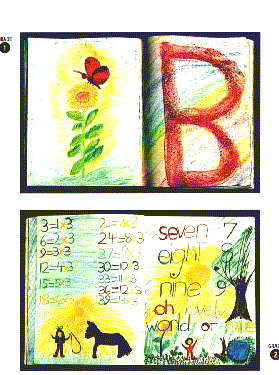AN OVERVIEW OF THE GRADE YEARS
Although, because of the age of our daughter, our main focus is on the kindergarten years, I have included this brief overview of the Grade years in order that parents with older children will have some idea of what their children should be studying.
As mentioned before, no text books are used - the children make their own lesson books, so you will need to purchase some blank books for this purpose. Many Steiner Product shops sell these and they are really not very expensive. In Steiner schools, the main lesson usually takes up the first 2 hours of the day and the same subject is studied for approximately 3-4 weeks before moving onto another subject. The rest of the day is then given over to more artistic pursuits.

GRADE 1
Introduction to writing through pictures and stories, phonics and sight vocabulary, fairy tales and nature stories, simple addition, subtraction and multiplication.
GRADE 2
Furthering reading and writing, introduction to grammar, fables and saints legends, arithmetic with larger numbers, numerical patterns and forms, times tables.
GRADE 3
Composition, reading, speech, cursive writing, farming and gardening, shelter and building, arithmetic with complicated numbers and practical examples, grammar (basic parts of speech, sentence building and structure, punctuation and capitalization), reading and writing music.
GRADE 4
Composition, letter writing, alliterative poetry, grammar (tenses, more parts of speech), Norse mythology, Native American legends, local geography and history, fractions, animals in relation to human beings.
GRADE 5
Composition and continuing grammar studies, mythology of ancient civilisations (India, Persia, Babylonia, Egypt and Greece), Geography, botany, review of fractions, the metric system, decimals.
GRADE 6
Composition, public speaking, Roman and early Medieval history, European Geography, geology, physics (optics, heat and acoustics), astronomy, constructive geometry, mathematical and word problems, business maths and algebra (interest, percentage, discount).
GRADE 7
Creative writing, Renaissance culture, the Reformation, the age of exploration, Geography, physics (heat and mechanics), inorganic chemistry, nutrition and physiology, algebra.
GRADE 8
Practical writing, Shakespeare, history from the Age of Revolution to the present, world geography, physics (electricity and magnetism), organic chemistry, algebra, solid geometry, meteorology and climatology.
Obviously, as with the kindergarten, none of this is written in stone. The good thing about homeschooling using a particular method is that you can 'do' things to suit yourself, whilst still sticking to the basic method. For example, many homeschoolers feel that the only maths their child needs to know is 'everyday' stuff, ie addition, subtraction, multiplication and division, telling the time, weights and measures and handling money etc - just try and 'start' a certain subject when your child is READY - don't rush them.